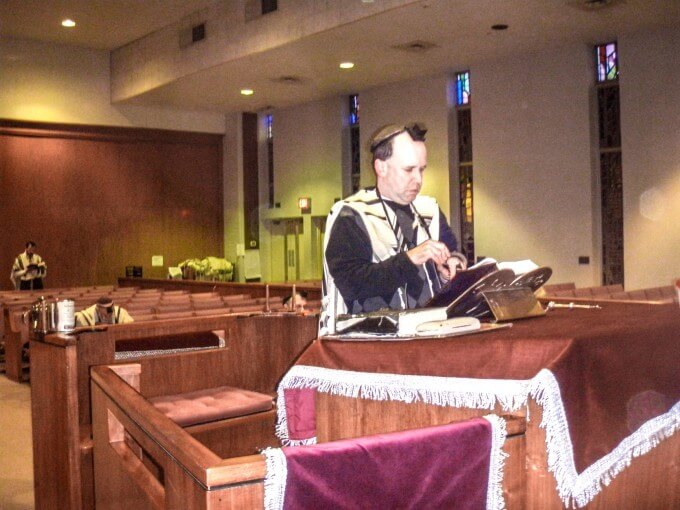PALMER, Mass. — Each summer, Camp Ramah in New England (CRNE) brings close to 60 post-army emissaries to serve as bunk counselors and teach in such specialty areas as dance, sports, swimming, nature, woodworking, Hebrew and Jewish Studies, ropes and krav maga. Campers and staff are accustomed to such names as Neta, Ela, Tal, Ofer…
This past summer, however, one young Israeli tennis player, who spent a week at Camp Ramah in Canada, followed by a few days at CRNE, turned a few heads with his unusual first and last name – Fahoum Fahoum. “Fahoum means navon, like your division name, Nivonim, (the wise ones), the young visitor told a packed open-aired tent of 16-year-olds during an evening discussion at the Palmer, Mass. camp. The campers were captivated by Fahoum’s personal story and peppered him with questions about his life in Israel.
Fahoum loved growing up in Haifa. “Growing up as an Arab Muslim in Haifa was very special,” he says. “Haifa is known for its relationship between Arabs and Jews. I am thankful for growing up in Haifa because the environment gave me a better chance to integrate.”
Fahoum and his sister, Nadine Fahoum, were the first Israeli Arabs to attend the Reali School in Haifa. He credits his mother with the idea of sending him to the Israeli Jewish school but notes, “there were many concerns among our friends in the Arab community.”
“I believe the community was worried that the school would not be ready to welcome someone like me,” he recalls. “Along the years, people around saw how the support the Hebrew Reali School gave my sister and me, and how it nurtures its children. They actually became very curious about becoming a part of the Reali family as well.”
Fahoum says both he and his sister received a fine education and a wonderful introduction to tennis through their years at Reali. Nadine went on to play in such tournaments as the Juniors Wimbledon, the U.S. Open and the Olympics. Fahoum was the number one junior in Israel at age 14. “Tennis is like a language. It is used to communicate with others. It is a common language,” observes Fahoum.
Nadine attended Old Dominion University in Virginia and ultimately transferred to Duke University, where she played #1 on the women’s tennis team. Upon graduation, she went on to work in New York for the Israel Tennis Centers and is currently pursuing graduate studies at New York University.
Fahoum also began his college academic and tennis careers at Old Dominion; then transferred to Quinnipiac University in Hamden, where he played tennis and is pursuing a communications major and business minor. He is interning at the Quinnipiac Alumni Association in the office of Public Affairs and Development. He hopes to attend graduate school at the Yale School of Management.
“I hope to accomplish mutual understanding and future between Arabs and Jews, using sports as a tool for communication,” he says.
During Fahoum’s stint at the two Ramah camps, he did a lot more than teach tennis. Bryan Gerson, head of the sports program at Camp Ramah in New England, observed, “Fahoum adds a professionalism-on and off the courts-with a great personality and a wonderful message of inclusion. Sally Klapper of Stamford, now a junior at Ramaz in Manhattan, called the experience of having an Israeli Arab at camp “eye opening.” “It was interesting to hear from someone who is so completely accepted into Israeli society,” she said.
Bringing an Israeli Arab to a Ramah camp is not an obvious move for an observant, Zionistic Jewish summer camp. Rabbi Mitch Cohen, the National Ramah Director, feels that bringing Nadine Fahoum to three of its eight Ramah camps in the United States and Canada is very important. “Bringing Fahoum to Camp Ramah helps to emphasize the importance of co-existence and tolerance of other people, especially at a time when Jewish-Muslim relations are so sensitive. Through tennis, and the great work of the Israel Tennis Center, Fahoum inspires us with his life story.”
And Fahoum couldn’t be more pleased with his time at Ramah camps. “The visit really made me feel like home. I came to Ramah to learn more about the Jewish community abroad and share some of my experience and future goals with its members. My being in Ramah allowed the camp to have a more complete experience of Israel. After all, Israel is not all Jewish, so my visit helps complete the picture. I hope that after my visit, both campers and staff will have greater confidence in a mutual future between Arabs and Jews.”
Fahoum remains both realistic and hopeful as to the power of sports. “Sports provides a tool for communication,” he notes. “Although Arabs and Jews live next to each other, they have no common language and therefore rarely integrate. Sports is a language in and of itself. Sports provides a common ground for different people from different backgrounds to integrate. Partnerships on the [tennis] court can lead to friendships off of it.”
Fahoum certainly thinks of one day returning home to Israel – but he remains both practical and realistic. “I will go back to Israel when I feel like I received enough support to begin establishing a concrete project back home.”
(Source: http://www.jewishledger.com)



